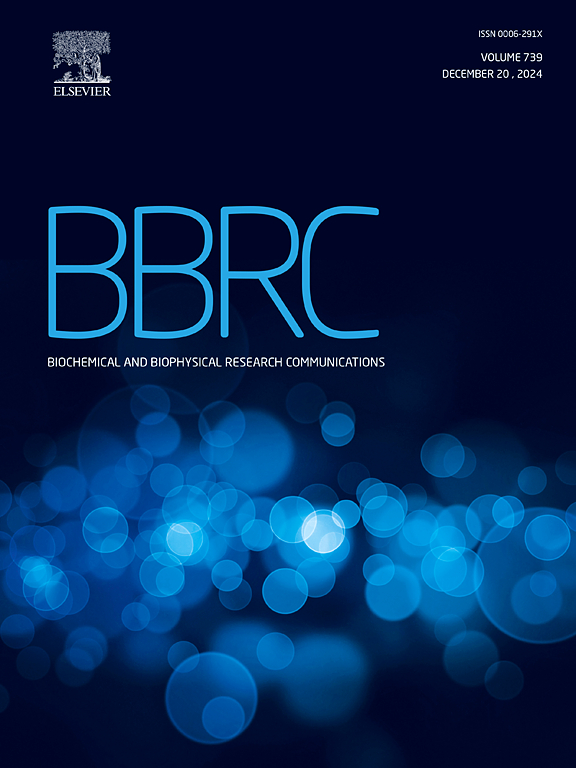中性粒细胞通过中性粒细胞胞外捕获器抑制 Gli1+ 干细胞的成骨分化,导致牙周炎患者骨质流失。
IF 2.5
3区 生物学
Q3 BIOCHEMISTRY & MOLECULAR BIOLOGY
Biochemical and biophysical research communications
Pub Date : 2024-10-28
DOI:10.1016/j.bbrc.2024.150916
引用次数: 0
摘要
牙周炎是一种严重的慢性口腔炎症,会导致牙周组织进行性和不可逆的破坏,最终导致牙齿脱落。在所涉及的免疫细胞亚型中,中性粒细胞在牙周炎的发生和发展中起着至关重要的作用。间充质干细胞(MSCs)是牙周组织的重要组成部分,有助于组织的发育、平衡和再生。最近的研究表明,中性粒细胞通过改变炎症环境显著影响间充质干细胞的功能。然而,牙周炎期间中性粒细胞对牙周间充质干细胞的具体影响仍不清楚,这凸显了我们对疾病机理认识的差距。在本研究中,我们利用 Gli1-CreERT2;mT/mG 转基因小鼠模型特异性标记了牙周组织中负责维持组织稳态的关键和代表性间充质干细胞亚群 Gli1+ 细胞。我们发现,中性粒细胞会抑制 Gli1+ 细胞的成骨分化,并通过分泌中性粒细胞胞外捕获物(NETs)加剧牙槽骨破坏,NETs 会诱导 Gli1+ 细胞的内质网应激。这些发现强调了嗜中性粒细胞对牙周间充质干细胞不同亚群在牙周炎发病机制中的关键影响,为了解牙周炎的潜在机制提供了宝贵的见解,并提出了旨在调节嗜中性粒细胞和间充质干细胞之间相互作用的潜在治疗策略。本文章由计算机程序翻译,如有差异,请以英文原文为准。
Neutrophils suppress osteogenic differentiation of Gli1+ stem cells via neutrophil extracellular traps and contribute to bone loss in periodontitis
Periodontitis is a severe and chronic oral inflammatory disease that leads to the progressive and irreversible destruction of periodontal tissues, ultimately resulting in tooth loss. Among the immune cell subtypes involved, neutrophils play a crucial role in the initiation and progression of periodontitis. Mesenchymal stem cells (MSCs) are essential components of periodontal tissue, contributing to tissue development, homeostasis, and regeneration. Recent studies have demonstrated that neutrophils significantly affect the function of MSCs by changing the inflammatory environment. However, the specific effects of neutrophils on periodontal MSCs during periodontitis remain unclear, highlighting a gap in our understanding of the disease mechanisms. In this study, we utilized the Gli1-CreERT2;mT/mG transgenic mouse model to specifically mark Gli1+ cells, a critical and representative subset of MSCs in the periodontal tissues responsible for maintaining tissue homeostasis. We reveal that neutrophils inhibit the osteogenic differentiation of Gli1+ cells and exacerbate alveolar bone destruction by secreting neutrophil extracellular traps (NETs), which induce endoplasmic reticulum stress in Gli1+ cells. These findings highlight the pivotal impact of neutrophils on distinct subpopulations of periodontal MSCs in the pathogenesis of periodontitis, offering valuable insights into the underlying mechanisms of the disease and suggesting potential future therapeutic strategies aimed at modulating the interactions between neutrophils and MSCs.
求助全文
通过发布文献求助,成功后即可免费获取论文全文。
去求助
来源期刊
CiteScore
6.10
自引率
0.00%
发文量
1400
审稿时长
14 days
期刊介绍:
Biochemical and Biophysical Research Communications is the premier international journal devoted to the very rapid dissemination of timely and significant experimental results in diverse fields of biological research. The development of the "Breakthroughs and Views" section brings the minireview format to the journal, and issues often contain collections of special interest manuscripts. BBRC is published weekly (52 issues/year).Research Areas now include: Biochemistry; biophysics; cell biology; developmental biology; immunology
; molecular biology; neurobiology; plant biology and proteomics

 求助内容:
求助内容: 应助结果提醒方式:
应助结果提醒方式:


